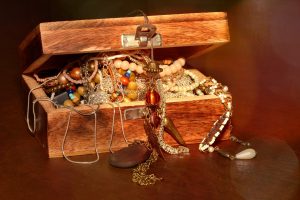Treasures
 How does one measure wealth? Obviously, money can be counted, interest rates calculated, dividends added and debits deducted, but surely there is more to the measure of a man’s worth than the bottom line of a spread sheet. For example: Those who have been blessed with children are indeed rich in the treasures of earth. The Word of God teaches us that, “children are an heritage of the LORD: and the fruit of the womb is his reward.” And then consider the home—it is more than a house. To have a peaceful haven filled with love and acceptance and the fellowship of a family who fears the Lord, are priceless treasures that are easily taken for granted.
How does one measure wealth? Obviously, money can be counted, interest rates calculated, dividends added and debits deducted, but surely there is more to the measure of a man’s worth than the bottom line of a spread sheet. For example: Those who have been blessed with children are indeed rich in the treasures of earth. The Word of God teaches us that, “children are an heritage of the LORD: and the fruit of the womb is his reward.” And then consider the home—it is more than a house. To have a peaceful haven filled with love and acceptance and the fellowship of a family who fears the Lord, are priceless treasures that are easily taken for granted.
But, someone might counter, “A home requires a house, and a house full of children requires a host of essentials. Just try to keep the wolves from the door of your happy home, without money.” All right, I concede that, though “the best things in life are free,” without the funds to maintain them, we would starve to death in the first week, or freeze in the shivering cold. Though our cup runneth over, we must have the money to pay the pourer.
Perhaps it is hard to focus on the future while the present requires so much of us, but you should also know that the Word of God speaks of a truer treasure than all of our present joys. It says,“…lay up for yourselves treasures in heaven, where neither moth nor rust doth corrupt, and where thieves do not break through nor steal: (Matthew 6:19-20).” In exchange for your confident dependence upon Him, God promises forgiveness of sin and a home in heaven. And then, as a believer, you can collect priceless treasures there, by your humble service here. Wise is the man who considers tomorrow, today!
Bottom line, …you are certainly rich with the temporal treasures of earth, and God has made it possible for you to have eternal treasure in exchange for your faith. Tell me—where is your treasure? It is a critical question, “For where your treasure is, there will your heart be also. (Matthew 6:21).”



 So, we ignore God and have it our way: we abuse our bodies with drugs and alcohol, we indulge in sexual pleasures outside of marriage and, for many, contrary to nature, we shirk the responsibilities required to subsist and look to government and good hearted neighbors to fill our stomachs and our gas or oil tanks. We work hard to keep from working, …after all, we say, “I have my rights.” We choose foolish independence and then, contrary to our philosophical moorings, we vote to make ourselves pawns in the hands of the governmental ruling class that lives in Washington and our state capitals.
So, we ignore God and have it our way: we abuse our bodies with drugs and alcohol, we indulge in sexual pleasures outside of marriage and, for many, contrary to nature, we shirk the responsibilities required to subsist and look to government and good hearted neighbors to fill our stomachs and our gas or oil tanks. We work hard to keep from working, …after all, we say, “I have my rights.” We choose foolish independence and then, contrary to our philosophical moorings, we vote to make ourselves pawns in the hands of the governmental ruling class that lives in Washington and our state capitals.